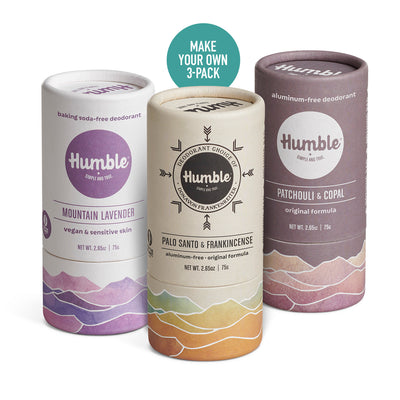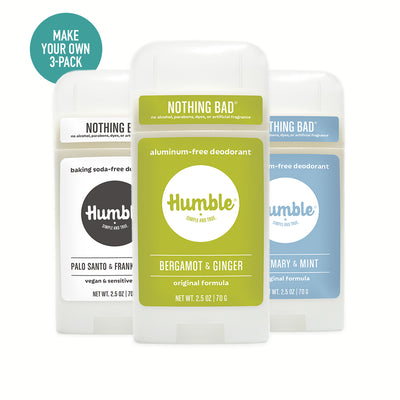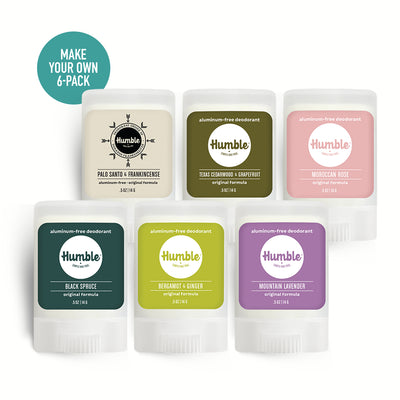Congratulations on deciding to live a cleaner lifestyle! What we put on our bodies is an important piece of the puzzle. Breaking up with antiperspirant and conventional deodorant means saying goodbye to parabens, aluminum, alcohols, dyes, and other ingredients that are unnecessary. Let's dive right into what ingredients to stay away from and what to look for.

Deodorant ingredients to avoid
There’s plenty of bad stuff in antiperspirants and conventional deodorants, but surprisingly, some of the worst offending ingredients can show up in "natural" deodorant too. Familiarize yourself with the list of what to avoid, and always read ingredient labels thoroughly.
Aluminum
You've probably seen aluminum or aluminum salts listed as a key ingredient in conventional products. It's a common antiperspirant. It works by clogging sweat ducts to temporarily stop sweat flow. Going aluminum-free means letting your body's natural processes happen uninhibited.
Antiperspirant
As mentioned above, be wary of any deodorants that list antiperspirant. Antiperspirants are made from compounds, like aluminum salts, that prevent your body from sweating.
Parabens
Parabens are a preservative, and one of the most common ingredients in most cosmetic products, including deodorant. They show up on ingredients lists as methylparaben, propylparaben, butylparaben, or ethylparaben. Like aluminum, parabens get absorbed by your skin and impersonate estrogen1. It’s not proven that parabens cause breast cancer, but the FDA is monitoring new data that emerges. The fact that they’re linked is enough to be concerned, not to mention they're unnecessary.
Phthalates
Phthalates are plasticizers often found in beauty care products. Emerging research shows exposure to phthalates has adverse effects on animal reproductive systems and would likely affect humans in the same way.2
Propylene glycol
This chemical is a skin conditioning agent that is considered to be generally safe, but is a known skin irritant.3
Talc
Talc is a naturally occurring mineral used in some deodorants to absorb moisture. Talc in personal care products has been linked to cancer and contamination with asbestos, a known carcinogen. Talc is currently unregulated in cosmetic products, but is being further researched by the FDA.4 Other less problematic plant and mineral-based ingredients, like corn starch and arrowroot powder, are better go tos for moisture absorption.

Choosing the right aluminum free deodorant
The key to selecting the right aluminum free deodorant is the ingredients list. You want a deodorant with worry-free ingredients that gets the job done and is a joy to use. The icing on top? A product that is maximally effective using the fewest ingredients possible.
We've complied a best-of list. Many of these ingredients you might even have in your kitchen. That's right. You know something's safe when it's good enough to eat (though please abstain). Here’s what to look for:
Aloe Vera
If you’ve ever been sunburned, you’ve probably heard of aloe. It’s plant based, effective at combatting bacteria, and gentle on sensitive skin.
Arrowroot Powder
This little miracle powder is a great moisture absorbing agent.
Baking Soda
Probably the most effective ingredients in neutralizing odors and absorbing moisture. Some people do experience skin irritation from baking soda. Thankfully there are great alternatives. We make a
sensitive skin line of deodorants that are baking soda free.
Coconut Oil
If there’s something coconut oil can’t do, we haven’t found it yet. Coconut oil moisturizes, soothes irritated skin, and is anti-microbial.
Corn Starch
It's not just for thickening soups and sauces. Corn starch naturally absorbs moisture.
Essential Oils
High quality essential oils and botanical extracts are a wonderful way to scent products. And for millennia, they have been revered for their aromatherapeutic properties.
Kaolin Clay
A centuries old moisture-absorbing agent that is known to be gentle, yet effective.
Magnesium Hydroxide
This gentle alternative to baking soda is a naturally-occurring compound that has antibacterial properties—great for combatting odor-causing bacteria.
Witch Hazel
Often found in products for acne-prone skin, witch hazel helps shrink pores (instead of clogging them) to reduce sweating in your pits.
Zinc Oxide
A gentle mineral and anti-microbial ingredient, zinc oxide keeps your pits clean. Just make sure it's listed as “non-nano zinc" to ensure the particles aren't small enough to penetrate the skin.
If an aluminum free deodorant has some combination of these ingredients, you’re in the right place. Keep an eye out for any long, weird-sounding names. If you don't recognize the word, look it up to be informed before putting it on your body.
1 fda.gov 2 pubmed.gov 3 ewg.org 4 fda.gov











Leave a comment